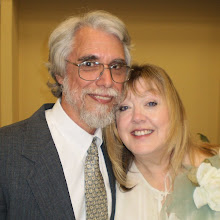Now, mind you, this was not a monolithic force in my life. Not all my life-teachers went by this doctrine. But some very influential and timely ones did and I was certainly influenced by them. And I would have stuck by it probably if I hadn't learned, the hard way, that it just doesn't work.
I tried. I tried to love faithfully without regard to my own needs—reckoning my needs to be irrelevant at the very least, or wickedly malevolent at the worst.
To shore up this kind of thinking, we were taught the empty conduit theory of God's working. The individual Christian worker is to be nothing but a pipe through which the love of God flows. And any part of our own individual personality that we allow to stay in the pipe gets in the way of God's love, making it ineffective or blocking it altogether. So we had to get out of the way and "make ourselves scarce," if such a thing were possible.
Now, I will be the first to say there is a validity in the metaphor of the vessel, or instrument of God. The gospel was entrusted to the apostles, who referred to themselves as "earthen vessels." And St. Francis prayed, "Make me an instrument of thy peace." But these don't make us invisible; they don't negate our being itself. We exist as creatures—as persons created in God's image.
So what is eros and is it as evil as we have thought? The different ways the word has been used range from "self-interested desire" to "biological life-force" to "unbridled lust." The latter results from the popularization of the word-form erotic, referring to the sexual. But while eros might be often flavored by gender ("la difference"), sex is not eros and hardly relevant to our meaning here, except as a distraction.
In 1986, Josef Pieper, a German philosopher and theologian published, in English translation, a long-awaited book, Faith Hope Love. He draws on scripture, as well as Christian authorities from Augustine and Thomas Aquinas to C.S. Lewis. In discussing Eros and Agape he wrote:
But such need-love, whose goal is its own fulfillment, is also the nucleus and the beginning in all our loving. It is simply the elemental dynamics of our being itself, set in motion by the act that created us. Hence it is fundamentally impossible for us to control it, let alone to annul it. It is the "yes" that we ourselves are before we are consciously able to say "yes" (or even "no").And so we are reconciled to the ever-present, never-to-be-denied need-love, the eros that makes us feel so uncomfortable. It remains an indestructible attribute of our eternal souls. and because we are made this way we are capable of two-way, multifaceted love. We are not empty pipes. We are living souls. We are full of needs—thirsty to the nth degree—crying out desperately in the wilderness, "Give us something to drink." But because we love ourselves, accepting our need-love humanity, we come to know how to love others. Because we see and accept our eros factor, the untamed life-force in us, we accept it in others and affirm their existence and hope, pray and act for their well-being. And others do the same for us and we live together and we love.

No comments:
Post a Comment